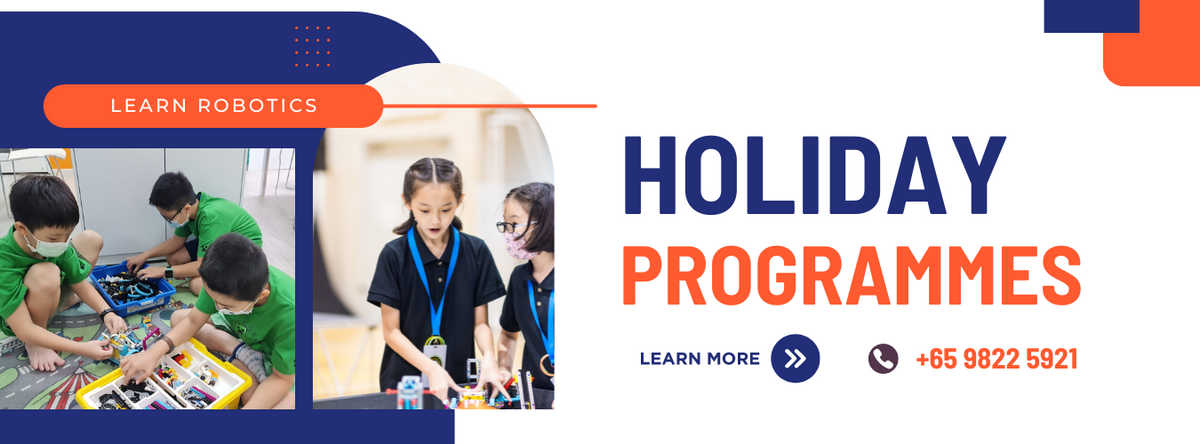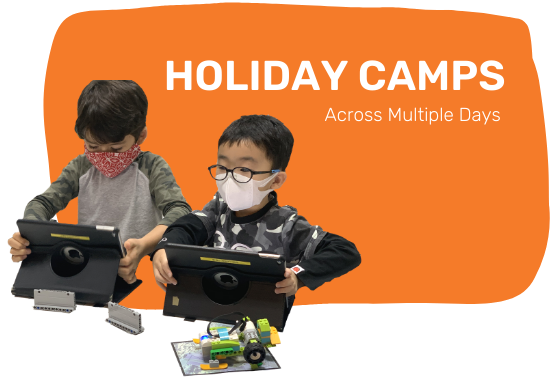STEAM Engine - Top Robotics & Coding (STEAM) Learning Centre in Singapore (Potong Pasir)
STEAM = Science, Tech, Engineering, Art, Math (Not just STEM Learning!)
What Makes Us Different?
We focus on fostering life-long learning and genuine interest in STEAM Education focusing on robotics and coding, not just winning in competitions.
- Based on research done by official partners like LEGO Education, KUBO Robotics and more
- Help to build positive reinforcements related to STEAM learning and concepts (no tests or stress, more play & exploration)
- Encourage collaboration & communication between different types of learners (not about working with the top students only)
- Small trainer to student ratio (1 trainer : 4 students)
Premium Workshops & Courses
Quality Tools & Experienced Trainers
Private & Group Sessions
Testimonials & Reviews










Robotics & Coding Resources for Parents
Holiday Spirit with the Holiday Team Challenge: Creating Christmas-Themed Robots
Spark Holiday Magic with Christmas-Themed Robots! Combine festive cheer with STEM innovation this Christmas by hosting a Holiday Team Challenge! Inspire creativity as kids design and build robots with LEGO® Education kits. From Santa’s sleigh to holiday light shows, it’s the perfect mix of learning and fun!
What is an Arduino Engineering Kit? Comparison between Rev1 and Rev2
Robotics and mechatronics with the Arduino Engineering Kit (Rev1; Rev2). This comprehensive educational platform is designed for students and enthusiasts to master practical engineering skills through hands-on projects. Learn to build and program real-world applications, bridging the gap between theory and practice using the versatile Arduino board. We compare the original Rev1 (featuring the MKR1000) with the advanced Rev2 (with Nano 33 IoT and MATLAB/Simulink integration) to help you choose the best project-based learning solution for mastering control systems, coding, and design.
Top Educational and Meaningful Gift Ideas for Children (2025) - STEAM Toys
An educational gift is a gift that keeps on giving. Help children fall in love with STEM Application, Arts and more when you let them have these gifts!
Holiday Spirit with the Holiday Team Challenge: Creating Christmas-Themed Robots
Spark Holiday Magic with Christmas-Themed Robots! Combine festive cheer with STEM innovation this Christmas by hosting a Holiday Team Challenge! Inspire creativity as kids design and build robots with LEGO® Education kits. From Santa’s sleigh to holiday light shows, it’s the perfect mix of learning and fun!
What is an Arduino Engineering Kit? Comparison between Rev1 and Rev2
Robotics and mechatronics with the Arduino Engineering Kit (Rev1; Rev2). This comprehensive educational platform is designed for students and enthusiasts to master practical engineering skills through hands-on projects. Learn to build and program real-world applications, bridging the gap between theory and practice using the versatile Arduino board. We compare the original Rev1 (featuring the MKR1000) with the advanced Rev2 (with Nano 33 IoT and MATLAB/Simulink integration) to help you choose the best project-based learning solution for mastering control systems, coding, and design.
Top Educational and Meaningful Gift Ideas for Children (2025) - STEAM Toys
An educational gift is a gift that keeps on giving. Help children fall in love with STEM Application, Arts and more when you let them have these gifts!












